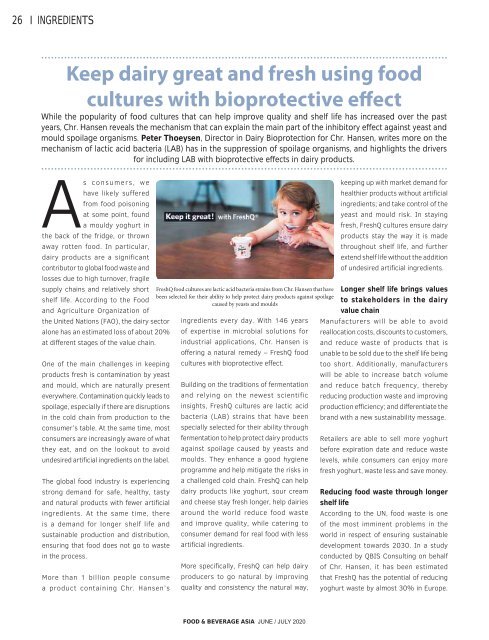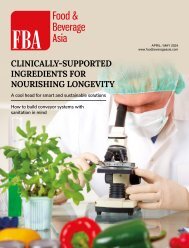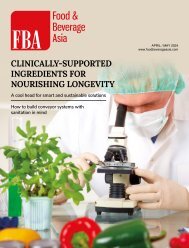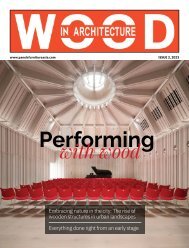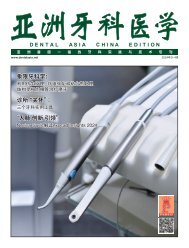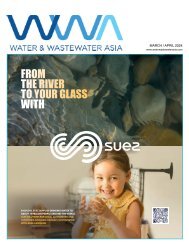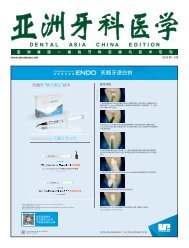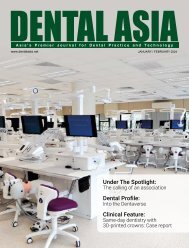Food & Beverage Asia June/July 2020
Food & Beverage Asia (FBA) is the leading source of food and beverage news in Asia since 2002. FBA delivers a comprehensive view of the food and beverage landscape, spanning across the latest health and nutrition trends and industry innovations in ingredients, recipe formulations, food science, sustainability, packaging, and automation, as well as advancements in agri and food-tech.
Food & Beverage Asia (FBA) is the leading source of food and beverage news in Asia since 2002. FBA delivers a comprehensive view of the food and beverage landscape, spanning across the latest health and nutrition trends and industry innovations in ingredients, recipe formulations, food science, sustainability, packaging, and automation, as well as advancements in agri and food-tech.
Create successful ePaper yourself
Turn your PDF publications into a flip-book with our unique Google optimized e-Paper software.
26<br />
INGREDIENTS<br />
Keep dairy great and fresh using food<br />
cultures with bioprotective effect<br />
While the popularity of food cultures that can help improve quality and shelf life has increased over the past<br />
years, Chr. Hansen reveals the mechanism that can explain the main part of the inhibitory effect against yeast and<br />
mould spoilage organisms. Peter Thoeysen, Director in Dairy Bioprotection for Chr. Hansen, writes more on the<br />
mechanism of lactic acid bacteria (LAB) has in the suppression of spoilage organisms, and highlights the drivers<br />
for including LAB with bioprotective effects in dairy products.<br />
As consumers, we<br />
keeping up with market demand for<br />
have likely suffered<br />
healthier products without artificial<br />
from food poisoning<br />
ingredients; and take control of the<br />
at some point, found<br />
yeast and mould risk. In staying<br />
a mouldy yoghurt in<br />
fresh, FreshQ cultures ensure dairy<br />
the back of the fridge, or thrown<br />
away rotten food. In particular,<br />
dairy products are a significant<br />
contributor to global food waste and<br />
products stay the way it is made<br />
throughout shelf life, and further<br />
extend shelf life without the addition<br />
of undesired artificial ingredients.<br />
losses due to high turnover, fragile<br />
supply chains and relatively short FreshQ food cultures are lactic acid bacteria strains from Chr. Hansen that have Longer shelf life brings values<br />
been selected for their ability to help protect dairy products against spoilage<br />
shelf life. According to the <strong>Food</strong><br />
caused by yeasts and moulds<br />
and Agriculture Organization of<br />
to stakeholders in the dairy<br />
value chain<br />
the United Nations (FAO), the dairy sector<br />
alone has an estimated loss of about 20%<br />
at different stages of the value chain.<br />
One of the main challenges in keeping<br />
products fresh is contamination by yeast<br />
and mould, which are naturally present<br />
everywhere. Contamination quickly leads to<br />
spoilage, especially if there are disruptions<br />
in the cold chain from production to the<br />
consumer’s table. At the same time, most<br />
consumers are increasingly aware of what<br />
they eat, and on the lookout to avoid<br />
undesired artificial ingredients on the label.<br />
The global food industry is experiencing<br />
strong demand for safe, healthy, tasty<br />
and natural products with fewer artificial<br />
ingredients. At the same time, there<br />
is a demand for longer shelf life and<br />
sustainable production and distribution,<br />
ensuring that food does not go to waste<br />
in the process.<br />
More than 1 billion people consume<br />
a product containing Chr. Hansen’s<br />
ingredients every day. With 146 years<br />
of expertise in microbial solutions for<br />
industrial applications, Chr. Hansen is<br />
offering a natural remedy – FreshQ food<br />
cultures with bioprotective effect.<br />
Building on the traditions of fermentation<br />
and relying on the newest scientific<br />
insights, FreshQ cultures are lactic acid<br />
bacteria (LAB) strains that have been<br />
specially selected for their ability through<br />
fermentation to help protect dairy products<br />
against spoilage caused by yeasts and<br />
moulds. They enhance a good hygiene<br />
programme and help mitigate the risks in<br />
a challenged cold chain. FreshQ can help<br />
dairy products like yoghurt, sour cream<br />
and cheese stay fresh longer, help dairies<br />
around the world reduce food waste<br />
and improve quality, while catering to<br />
consumer demand for real food with less<br />
artificial ingredients.<br />
More specifically, FreshQ can help dairy<br />
producers to go natural by improving<br />
quality and consistency the natural way,<br />
Manufacturers will be able to avoid<br />
reallocation costs, discounts to customers,<br />
and reduce waste of products that is<br />
unable to be sold due to the shelf life being<br />
too short. Additionally, manufacturers<br />
will be able to increase batch volume<br />
and reduce batch frequency, thereby<br />
reducing production waste and improving<br />
production efficiency; and differentiate the<br />
brand with a new sustainability message.<br />
Retailers are able to sell more yoghurt<br />
before expiration date and reduce waste<br />
levels, while consumers can enjoy more<br />
fresh yoghurt, waste less and save money.<br />
Reducing food waste through longer<br />
shelf life<br />
According to the UN, food waste is one<br />
of the most imminent problems in the<br />
world in respect of ensuring sustainable<br />
development towards 2030. In a study<br />
conducted by QBIS Consulting on behalf<br />
of Chr. Hansen, it has been estimated<br />
that FreshQ has the potential of reducing<br />
yoghurt waste by almost 30% in Europe.<br />
FOOD & BEVERAGE ASIA JUNE / JULY <strong>2020</strong>


